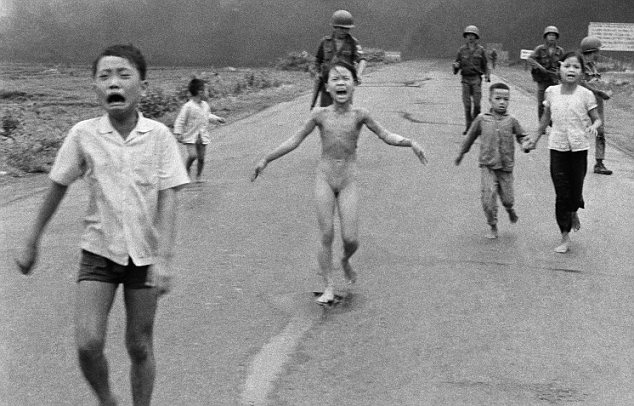
Nine-year-old Kim Phuc, center, flees Trang Bang following a napalm attack From left: Phan Thanh Tam, Phan Thanh Phouc, Kim Phuc, Ho Van Bon, and Ho Thi Ting. (AP Photo/Nick Ut)
By BRUCE ROBBINS
I use the word “atrocity” to signify an act of cruelty judged to be extreme or outrageous because it is collective, unnecessary, and/or indiscriminate. John Berger does not use this word in his essay “Photographs of Agony,” written during the Vietnam War, which famously questions the value of photographic representations of extreme suffering. But his examples include civilians killed and wounded by American aerial bombardment. By my criteria, the aerial bombardment of non-combatants would seem a paradigmatic instance of atrocity. In the era of the drone, it has of course remained a very timely one.
In “Photographs of Agony” Berger argues that although the purpose of these photographs is seemingly to “awaken concern,” that is not their actual effect. Their actual effect is to depoliticize, to discourage people from taking the appropriate action. That is why they can be “published with impunity.” This kind of argument has come to seem intuitive and even self-evident. It reappears of course in Susan Sontag on photography, and I for one felt its impact on Ann Cvetkovich’s brilliant analysis of sensationalism. Equating war with bodily pain, Cvetkovich argued, effaces war’s “structural and historical causes,” leading to “helpless outrage and a sense that nothing can be done.” Which raises the question of whether we can imagine any visual treatment that would not have this effect. And whether Cvetkovich is therefore making a backhanded argument for the political superiority of the verbal over the visual.
If you follow John Berger’s essay closely, you will find that its simplicity is somewhat misleading. Moments of agony, Berger says, “are discontinuous with all other moments.
They exist by themselves. But the reader who has been arrested by the photograph may tend to feel this discontinuity as his own personal moral inadequacy. And as soon as this happens even his sense of shock is dispersed: his own moral inadequacy may now shock him as much as the crimes being committed in the war. Either he shrugs off this sense of inadequacy as being only too familiar, or else he thinks of performing a kind of penance–of which the purest example would be to make a contribution to OXFAM or to UNICEF.
In both cases, the issue of the war which has caused that moment is effectively depoliticized. The picture becomes evidence of the general human condition. It accuses everybody and nobody.
I’m not sure I agree. Think of the Palestinians, with whom Berger has consistently expressed his solidarity; he came out for a boycott of Israel within months of the beginning of the campaign in 2005. Photographs of the aerial bombardment of Gaza in 2014 arguably could not be published with impunity. In the US at least, young people, who got their visuals of Gaza from social media rather than from television, where the news was more carefully curated, were dramatically more likely than others to be critical of Israel. Here and even more so in Europe, the movement to boycott Israel has quickened, in large part I think because of visual coverage.
What interests me most here, however, is the central issue of accusation, which is to say responsibility–where responsibility for atrocity should be located. Looking at photographs of agony, Berger says, we are likely to make the mistake of accusing ourselves. And if we make this mistake, we will end up accusing “everybody and nobody,” which is to say de-politicizing the atrocity. Again, this seems simple and even self-evident. But is it really? Is self-accusation always politically misleading and/or debilitating?
I can think of at least two reasons why those who view photographs of agony might be inclined to make the mistake (if it is a mistake) of accusing themselves, or accusing themselves excessively or irrationally. First of all, there is what Amanda Anderson has called “aggrandized agency.” Atrocity is important business. Doing something about it is therefore a high vocation. For all the anxiety it brings with it, being tasked with a high vocation or mission is not entirely unpleasant. To be reprimanded for not fulfilling that mission, for not acting, even for not acting to stop an atrocity is also a form of flattery. It tells us that we were capable of accomplishing that which we have not accomplished and even that we were meant to accomplish it–that we were and are both more important than we thought and more powerful.
A second reason for self-accusation is that, willing or not, we who feel ourselves addressed by Berger’s essay know that we are citizens, subjects, residents, or allies of the country committing the violence. This membership or affiliation is not really optional. Public announcements that one hates one’s country are not unknown, but they are rare, even in a time when the candidacy of Donald Trump has multiplied scenarios of mass departure. National disaffliation is socially and morally expensive, in fact very expensive, and all the more so when your country finds itself mobilizing for war. There are places around the world where no one will believe you if you say you do not support your country in wartime. And in a way they’re right. We belong to our country in the very practical sense that, whatever we think of it, we have reaped certain non-refundable advantages from it.
In other words, self-blame is not entirely a mistake. If you are an American or an Israeli or a Northern European, it is not a mistake to recognize, however obscurely, that the privileges and the relative prosperity you enjoy depend in some way on violence your country has perpetrated and continues to perpetrate elsewhere. This was the declared opinion for example of George Orwell. “The overwhelming bulk of the British proletariat,” Orwell wrote in 1939, “doesn’t live in Britain but in Asia and Africa . . . This is the system which we all live on.” It was also the opinion of Jean-Paul Sartre. In his 1961 preface to Fanon’s The Wretched of the Earth, Sartre writes: “You know well enough that we are exploiters. You know too that we have laid our hands on first the gold and the metals, then the petroleum of the ‘new continents,’ and that we have brought them back to the old countries. This was not without excellent results, as witness our palaces, our cathedrals, and our great industrial cities; and then when there was a threat of a slump, the colonial markets were there to soften the blow or to divert it. Crammed with riches, Europe accorded the human status de jure to its inhabitants. With us, to be a man is to be an accomplice of colonialism, since all of us without exception profited by colonial exploitation.” Note the “all of us without exception.”
As it happens, Sartre and Orwell are two of the predecessors who have been most important to John Berger. By leaving his country to live elsewhere, Berger perhaps went further than either of them in what you might call his national disaffiliation or (in one sense at least) his cosmopolitanism. But I think he operates within the same ethical problematic. All of them have been criticized for being too ethical. He is tormented by the same demons, and he speaks a similar language. The name I have been giving to this language is “the discourse of the beneficiary.” As I think of it, the discourse of the beneficiary is defined by three elements: 1) it is a denunciation of global inequality, a denunciation of the system’s unequal distribution of its costs and benefits; 2) it is a denunciation of global inequality that is addressed to the beneficiaries of that inequality; and 3) it is a denunciation of global inequality that is spoken by a beneficiary.
Both Sartre and Orwell have been taken to task by critics for a supposed excess of guilt, self-accusation, self-loathing. These psychological impulses are often seen as replacing or disastrously distorting their politics. I prefer to think of both as working within a structure of feeling, to use Raymond Williams’s still very apt expression, a structure of feeling that makes visible a rough geo-political logic in what might otherwise look like merely personal affect. Writing in The Road to Wigan Pier, Orwell said that for people like him, the end of the capitalist system would mean “abolishing a part of yourself.” Partial self-abolition is not the most stirring of revolutionary slogans. It sounds too much like personal asceticism, a secular reprise of the Christian ideal of self-sacrifice, or perhaps merely personal neurosis. But it makes a certain political or perhaps proto-political sense. Think of it as a response to the situation of a progressive in the metropolitan center or global North who is a) confronting violent injustice that is visited upon distant others, as in the case of the American bombs falling on Vietnam, and b) who is convinced that, however reluctantly, she or he is a beneficiary of the system that sent forth the bombers and the injustice. The desire to abolish a part of yourself may not be universal, but under these circumstances, when one is faced with empirical evidence of what the system means to those who pay the biggest price for it (the Vietnam photographs, Orwell’s experience in Burma), that desire would be a rational response to a particular historico-geographical placement. A placement that many of us have reason to recognize.
This placement has consequences that may be hard to accept. Logically speaking, the desire to abolish a part of yourself implies a politics–if politics is the right word– that by definition cannot be guided solely by the beneficiary’s self-interest. The politics and the desire are based on an assumption that many will also find questionable, even unsayable. The assumption is that inequality at the global level does not align perfectly with inequality at the domestic level– to put this more strongly, that your true economic situation is more determined by the country or region where you live than by your class position within that region or country. Here the discourse of the beneficiary parts company with left-wing piety, but will almost certainly find it hard to say so. I think John Berger speaks from this position, more or less, just as Sartre and Orwell do. His astonishingly prescient 1970 essay on Walter Benjamin calls for a political “re-examination” inspired by “the fact the proletarians of consumer societies are now less likely to arrive at revolutionary consciousness through the pursuit of their directly economic self-interests than through a wider and more generalized sense of pointless deprivation and frustration.” Berger does not come out and say that the proletarians of consumer societies cannot achieve revolutionary consciousness by following their economic self-interest because, in terms of economic self-interest, even they are among the global system’s economic beneficiaries. But I think this is what he implies. Only that proposition makes sense of the idea that direct economic self-interest can no longer be a sufficient political guide in the global North, even for its proletarians.
And if so, then it is no longer possible to think of a global politics that would exclude an element of disinterestedness. When Berger mentions OXFAM and UNICEF, he is contemptuous, and we all have some idea why. But it is strictly logical that humanitarian action should arise here as an option, however unpalatable. Politics, as we usually understand it, involves taking sides. Humanitarianism, as we usually understand it, either precludes taking sides or at any rate does not require it. Humanitarianism can afford to accuse “everybody and nobody,” like the depoliticized photos Berger is discussing, because it is defined not by accusation but by a problematic of indifference–by the task of overcoming the indifference of a spectator who is not herself suffering and who is thus presumed to be disinterested in both senses of the word. But the neatness of this opposition collapses from the moment when the collectivity you are trying to politicize does not share the self-interest of the side you are trying to get them to take. (As you yourself fail to share it, however passionate your commitment.) When a beneficiary of the system denounces that system to fellow beneficiaries, the listeners are structurally motivated not to listen, not to care. The key obstacle that has to be overcome is their indifference. At the global level, then, politics (again assuming such a thing as politics can be said to exist at the global level) therefore comes to be invaded by something like the problematic of humanitarianism– by the privilege of those who are not the ones suffering, yet who can imagine themselves as powerful or well-positioned enough to stop that suffering. In the effort to be accountable to justice at the global scale, we metropolitans find ourselves trying to make politics in a gray area between politics and what has seemed not to be politics at all.
Sliding as it does toward humanitarianism, the discourse of the beneficiary risks being a good deal less radical than ordinary left-wing politics. But in a sense it also tends to be more radical. Whether because it is not organic to a national movement with a multi-voiced constituency and with local achievements to protect or for some other reason, it tends to declare the present state of things absolutely intolerable. Berger uses the word intolerable often, and he uses it in a distinctive sense. In “Image of Imperialism,” his meditation on the famous photograph of the dead Che Guevara, he writes: “Guevara found the condition of the world as it is intolerable.” Notice the weird twist that follows: “It had only recently become so. Previously, the conditions under which two thirds of the people of the world lived were approximately the same as now. The degree of exploitation and enslavement was as great. The suffering involved was as intense and widespread. The waste was as colossal. But it was not intolerable because the full measure of the truth about these conditions was unknown–even by those who suffered it.” Berger suggests that this truth has become known thanks to movements of national liberation. But he also seems to be saying something else: that in order to find the world intolerable, you must have the power to change it, or have sensed or tasted or anticipated that power, have understood that such power exists. “The world is not intolerable until the possibility of transforming it exists but is denied.” Here Berger refuses the liberal orthodoxy that would make extreme suffering into a moral absolute. In a historical, even Hegelian mode, he makes suffering relative– relative to power and knowledge. This bestows a certain backhanded significance on purveyors of power and knowledge, wherever they might be located. Often, like him, they are located in a privileged metropolitan space.
This geo-political relativizing of suffering bestows significance on the figure of the beneficiary. To occupy a metropolitan location means, as we frequently insinuate, to enjoy a suspicious proximity to power. To some, any proximity to power will be disqualifying. To many, proximity to power will be undesired, unarticulated, and embarrassing. But it is also, I am suggesting, politically useful. Useful because (following Berger’s insight about Guevara, whose own political career could be understood within the discourse of the beneficiary) it makes available the metropolitan’s confidence that the world can indeed be transformed, that the capacity to transform it exists. And without this capacity, I repeat, the world would not rise to the standard of absolute intolerability.
In a longer version of this essay, I would try to answer the question of how, thinking of the world as intolerable, Berger thinks an atrocity ought to be represented. I would answer it by comparing his description in G. of the 1898 “massacre” (his word) of striking workers in the streets of Milan with a scene from the contemporary author whom Berger has said he most admires, Gabriel Garcia Marquez– the massacre of the striking banana plantation workers in One Hundred Years of Solitude. The point of this comparison would be to show that for Berger, though not for Garcia Marquez, atrocity is ordinary.
Atrocity is most often seen as terrible but exceptional. To liberal common sense, atrocity is an exception to the ordinary functioning of civil order, an exception that proves the rule of that order: that it does not normally generate extreme, collective, indiscriminate cruelty. The atrocity confirms the virtues of the normal social order by representing everything that order is not. This understanding is so strong that even Garcia Marquez, who is no liberal, falls into it, rescuing his revolutionary hopes only at the end of the novel and only by a gesture of social erasure that, as I would show, is unsettlingly congruent with the atrocity itself. It is this vision of atrocity that I would like to credit John Berger with transcending. His alternative is to see atrocity as unexceptional, merely crystallizing or making visible that which is already or generally the case. In G., the people themselves have decided that ordinary life is not worth living; they do not require a gesture of radical modernist estrangement on the part of their author because they are themselves modernists, dedicated to estrangement from a world that deserves nothing else. For Berger, atrocity is ordinary.
The other tenet of liberal wisdom that Berger is trying to avoid is the idea that atrocities are senseless, chaotic, incomprehensible, or (what amounts to the same thing) that atrocities are to be expected from time to time on the basis of what we know of human nature and the human condition, hence are beyond the reach of politics. Berger wrote G. before the current fashion for trauma theory, which generalizes the atrocity as the very paradigm of historical experience: experience as non-experience, as an event so overwhelming that it is unassimilable to conscious experience. And he was writing before the fashion for humanitarian intervention, which suggests that something can indeed be done to stop atrocity, but it must be done by ourselves, that is, by outsiders who represent a normal and orderly world, rather than by people on the ground, who are seen as morally compromised if not stereotypically and universally genocidal. The discourse of the beneficiary comes dangerously close to this assumption.
“On this side of the barricades,” Berger writes in his account of the massacre in Milan, “it is already the future.” This line is followed by an explanation that the “ruling minority” rules by taking the future away: it “needs to numb and, if possible, to kill the time-sense of those whom it exploits by proposing a continuous present. This is the authoritarian secret of all methods of imprisonment. The barricades break that present.”
This image of an alienated future that is restored on the barricades might seem predictable and unconvincing, much too trusting in Marxist providence. But Berger withdraws all guarantees. The workers on the streets of Milan are challenging their oppressors with “the single and simple weapon of justice,” Berger writes: “the justice of their own cause, crying out to the sky above Milan and to the future. Yet justice implies a judge. And there is no judge and no judgement.” This withdrawal of guarantees is nuanced by two further points. First, Berger does not withdraw from so-called linear, homogeneous time, as the more mystic and messianic Marxists like to put it. What he withdraws from is the “continuous present.” The continuous present is different because it cannot take you to a new place. That’s why those who are about to die in this scene walk or jump forward from the ending of a life into a future that stretches beyond that ending, a future that is discontinuous–the same word that created problems of moral inadequacy in “Photographs of Agony.” Here, by dramatic contrast, discontinuity is something to be desired.
The concept of temporal discontinuity comes up as a bad thing, when it leads to a feeling of moral inadequacy in viewers of the Vietnamese victims of American bombs, but it comes up as a good thing when it is experienced by the workers on the barricades of Milan. This looks like an inconsistency. But one could also say that the two discontinuities are subject to the logics of two different geo-political locations, and that in a sense Berger is calling attention to difference of geographical location as such. In the streets of Milan, Berger seems to be presupposing a norm by which people would not feel discontinuity as their own moral inadequacy, or would not feel such moments as discontinuous at all–would see them on the contrary as continuous with an atrocity-laden life which is, unfortunately, all too ordinary. In other words, one might hypothesize, discontinuity creates a feeling of moral inadequacy only for people in the countries which create atrocities, not for people in the countries that suffer them. The different experience of time is really a different experience of place and of power, and therefore a different moral standard. What might look like inconsistency merely reflects the structuring performed by what I’ve called the discourse of the beneficiary. The discourse of the beneficiary looks “merely” ethical, but in fact it presupposes that a single universal ethics is unattainable.
One pay-off of applying the concept of the beneficiary to John Berger, as I’ve been trying to do, is that it makes a certain sense out of the turn to peasant experience that is so distinctive of his work in the decades after G. The turn to peasant experience would seem to entail a significant turn with respect to the representation of atrocity. Berger’s books about peasants depict a way of life that, while it too involved a relentless siphoning off of so-called surplus and thus an inevitable entanglement in scarcity, is felt by those who lead it to be worth defending. The urban working class on the barricades, even if it is largely made up of former peasants, wants to abolish itself as a class. Actual peasants do not. What peasants want, Berger says again and again, is to survive, and to survive as peasants— that is, for their way of life to survive. Atrocity is ordinary for them in the sense that everything about the system around them, as Berger presents it, violates their way of life and threatens it with disappearance. But there is no room in this picture for the sort of positive temporal discontinuity that is experienced on the barricades in G., a breaking through the present to achieve a more desirable future.
Since Berger began his “Into their Labors” project, a shift in focus from revolution to survival has come to seem better suited to our moment. The “Historical Afterword” of Pig Earth, which explains the new focus on survival, does not mention global warming, but the devastation of the natural environment has of course made talk of revolution or progress seem inadequate without it. As Terry Eagleton writes in his Hope Without Optimism, “humanity can forge ahead only if it is still present on the planet to do so.” I am all for the survival of humanity–as long as it does not encourage us to surrender Berger’s fraught sense of inequality between himself and his subjects. The phrase from John 4:38 that Berger chose for his peasant trilogy, “Others have labored and ye have entered into their labors,” is a succinct re-statement of what I have called the discourse of the beneficiary: indeed, the new international translation of “entered into” is “reaped the benefits of.” Andy Merrifield notes that the old peasant woman who remains in the village continues to divide the world into two kinds of people, peasants and those who feed off peasants. Berger gives no evidence of disagreeing. If he doesn’t, then his peasants are not just an expression of what he and many others have called his romanticism; they are also a way of sustaining the discourse of the beneficiary.
What does this mean for the representation of atrocity? The ending of G. flirts with a more conventional representation of atrocity. The Slovene-speakers of Trieste who kill G. in the midst of another demonstration have mis-identified him as an Austrian agent, and though they are a poor and despised underclass, they are also the people whose assassination of Archduke Franz-Ferdinand sparked World War I. World War I is no one’s idea of coherent or desirable revolutionary action. In short, Berger here conjures up the specter of collective violence in which people die, but–to put this as strongly as possible– they die for nothing, or for nothing worth dying for. This comes dangerously close to what the mainstream media are always willing to believe about violence: that it is, like the atrocity, indiscriminate and unnecessary, which is to say meaningless. Whether or not it is the logical outcome of ordinary life, it can’t serve to change that life for the better.
The ending makes more sense as self-blame: as Berger dragging Bosnian nationalists onstage to perform a violent act whose coherence lies not in them but in the structured and intolerable inequality from which the beneficiary benefits. An act of self-blaming like the one to which he shows his hyper-sensitivity in the essay “Photographs of Agony.” The moral is that self-blaming of this sort can be more productive than the early essay suggests. Self-flagellation is not a satisfactory politics, but it does keep your eyes on the intolerable division of the world into haves and have-nots, and as such it has an ethical as well as an aesthetic force. The world is well and truly divided, but it is not divided into the violent and the non-violent, the terrorists and the rest of us.
***
Bruce Robbins is Old Dominion Foundation Professor in the Humanities at Columbia University. His book The Beneficiary is forthcoming from Duke University Press.






No Comments